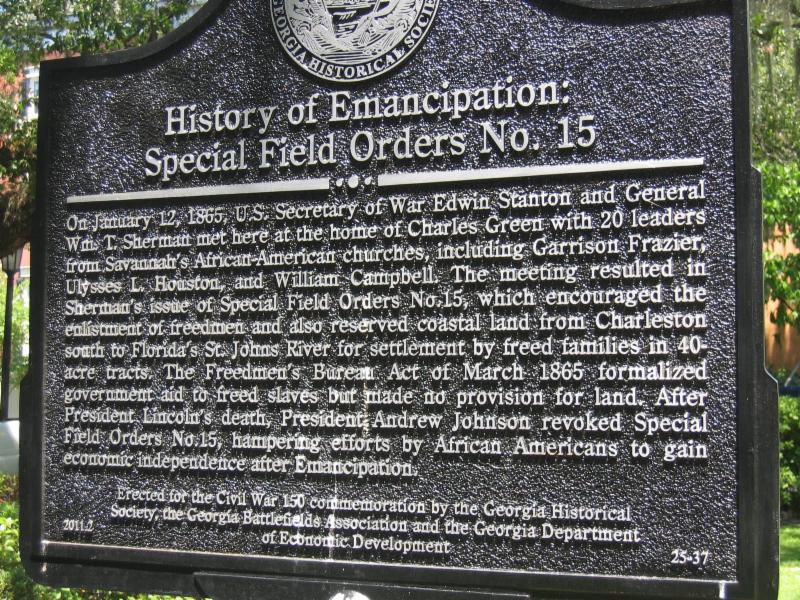by HEATHER GRAY

Special Field Order 15
As developed by General William T. Sherman January 16, 1865
In Forty Acres and a Mule: Part One, I included comments directly from General William Sherman’s “Memoir” about Savannah and the circumstances surrounding the freedmen as well as the interests of Lincoln’s Secretary of War, Edwin Stanton, to meet with the freedmen in Savannah to explore their needs and demands. This was followed by the actual minutes of the meeting that, importantly, included the listing of the Black leaders who represented the freedmen at the meeting.
Following the meeting with Black leaders in Savannah, Georgia on January 12, 1865, Sherman notes in his “Memoir” that he was asked by Edwin Stanton to “draft an order on the subject, in accordance with my own views, that would meet the pressing necessities of the case ” (the full commentary is below). The result was “Special Field Order 15” as articulated below. Sherman importantly adhered to the request of the freedmen to independently develop their land without interference of white persons. In Section II of Field Order 15, Sherman states:
At Beaufort, Hilton Head, Savannah, Fernandina, Saint Augustine, and Jacksonville the blacks may remain in their chosen or accustomed vocations; but on the islands, and in the settlements hereafter to be established, no white person whatever, unless military officers and soldiers detailed for duty, will be permitted to reside; and the sole and exclusive management of affairs will be left to the freed people themselves, subject only to the United States military authority and the acts of Congress. By the laws of war and orders of the President of the United States the negro is free, and must be dealt with as such.
In his “Memoir”, prior to providing the narrative of the “Special Field Order No. 15”, Sherman makes the following statement regarding Stanton and his review of the document. Below this statement is the actual “Special Field Order No. 15” directly from Sherman’s “Memoir”:
During Mr. Stanton’s stay in Savannah we discussed this negro question very fully; he asked me to draft an order on the subject, in accordance with my own views, that would meet the pressing necessities of the case, and I did so. We went over this order, No. 15, of January 16, 1865, very carefully. The secretary made some verbal modifications, when it was approved by him in all its details, I published it, and it went into operation at once. It provided fully for the enlistment of colored troops, and gave the freedmen certain possessory rights to land, which afterward became matters of judicial inquiry and decision. Of course, the military authorities at that day, when war prevailed, had a perfect right to grant the possession of any vacant land to which they could extend military protection, but we did not undertake to give a fee-simple title; and all that was designed by these special field orders was to make temporary provisions for the freedmen and their families during the rest of the war, or until Congress should take action in the premises. All that I now propose to assert is, that Mr. Stanton, Secretary of War, saw these orders in the rough, and approved every paragraph thereof, before they were made public. (Pg: 609)
Special Field Order No. 15.Headquarters Military Division of the Mississippi,
In the Field, Savannah, Ga., January 16, 1865.
1. The islands from Charleston south, the abandoned rice-fields along the rivers for thirty miles back from the sea, and the country bordering the Saint Johns River, Fla., are reserved and set apart for the settlement of the negroes now made free by the acts of war and the proclamation of the President of the United States.
JUSTICE INITIATIVE for more
